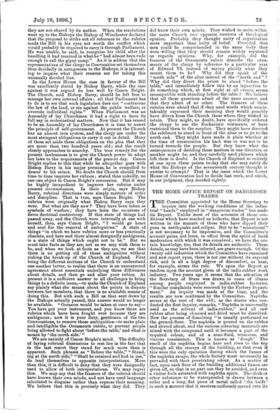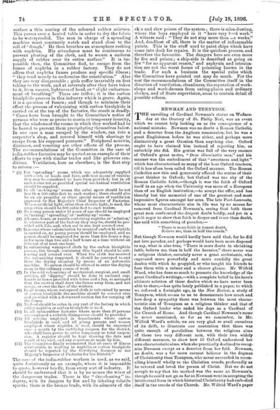THE HOME OFFICE REPORT ON DANGEROUS TRADES. T HE Committee appointed
by the Home Secretary to inquire into the working conditions of the indus- trial " hands " employed in 'dangerous trades" has made its Report. Unlike most of the accounts of these con- ditions which have reached us hitherto, that Report is not written in the manner of those who have dipped their pens in earthquake and eclipse. But to be "sensational" is not necessary to be impressive, and the Committee's account gains, not loses, in effect from the spirit of lucid moderation with which it was conceived ; we have the cer- tain knowledge, too, that its details are authentic. These details, as may have been inferred, are grave enough. Of the twenty odd industries which the Committee have examined and now report upon, there is not one without its especial risk, and in all a high degree of discomfort, as heat, for example, seems the rule. We open the Report at random upon the account given of the india-rubber work industry. Two years ago it seems that the attention of the Secretary of State was drawn to cases of illness among people employed in india-rubber factories. "Similar complaints were received by the Factory Depart- ment." An inquiry was made at the time, and the results are now confirmed by the Committee. Naphtha seems at the root of the evil; as the doctor who con- ducted the first inquiry, remarks, "Naphtha is universally used as the solvent of india-rubber," and all raw rubber after being cleansed and dried must be dissolved. Now the process of dissolving "is usually performed on the ground-floor. The naphtha is poured on the rubber and stirred about, and the various colouring materials are mixed with the compound until it becomes a part of the required colour, and of a semi-fluid, tenacious, and viscous consistency. This is known as dough.' The smell of the naphtha begins here and rises to the top through all the storeys of the building, so that even if this were the only operation during which the fumes of the naphtha escape, the whole factory must necessarily be pervaded with their penetrating odour. As a matter of fact, upon each floor of the building additional fumes are given off, so that in no part can they be avoided, and even a visitor feels saturated with naphtha spirit. The cloth or other substance to be waterproofed is drawn between a roller and a long, flat piece of metal called the knife' in such a manner that it receives uniformly spread over its surface a thin coating of the coloured rubber mixture. This passes over a heated table in order to dry the fabric to be waterproofed. The man in charge of a spreading machine must constantly watch and stand close to the roll of dough.' He then breathes an atmosphere reeking with naphtha. His attendance must be continuous to prevent pleating of the cloth, and to secure a uniform supply of rubber over its entire surface." It is im- possible then, the Committee find, to escape from the fumes of naphtha in a rubber factory. They do not affirm that naphtha fumes produce any specific illness ; " they tend merely to undermine the constitution." Also they are very disagreeable ; girls suffer invariably on first taking to the work, and at intervals after they have taken to it, from nausea, lightness of head, or" slight embarrass- ment of breathing." These are trifles ; it is the carbon bisulphide process in this industry which is grave. Again, it is a question of fumes ; and though to minimise their effect the process of vulcanising with carbon bisulphide is carried on at the top of the factories, the result is deadly. "Oases have been brought to the Committee's notice of persons who were so prone to mania or temporary insanity, that the windows of the rooms in which they worked had to be barred to prevent them precipitating themselves below. In one case a man escaped by the window, ran into a carpenter's shop, and covered himself with shavings to escape from his supposed pursuers." Peripheral neuritis, dizziness, and vomiting are other effects of the process. The recommendations of the Committee in the case of india-rubber factories may be quoted as an example of their efforts to cope with similar trades and like grievous con- ditions. Ventilation, here as elsewhere, is the first step to reform :—
(1) For 'spreading rooms which are adequately supplied with cowls or hoods and fans, sufficient means of ventila- tion may be considered to have been provided; but in all such rooms not so provided special mechanical ventilation should be supplied.
In all 'making-up' rooms the cubic space should be not less tirin 500 cubic feet to each worker ; there should also be an air propeller or other special means of ventilation approved by Her Majesty's Chief Inspector of Factories. Where artificial light, other than electric light, is used, the proportion should be 600 cubic feet to each worker.
No young person under 16 years of age should be employed in 'mixing," spreading,' or making-up' rooms. All cans, boxes, or vessels containing naphtha or solution,' in whatever part of the factory they may be, should be pro- vided with lids, and, when not in use, kept covered over. In rooms where vulcanisation by means of carbon bi,ulphide is carried on, no young person should be employed, and no person should be employed for more than five hours a day, or for more than two and a half hours at a time without an interval of at least one hour.
(6) In vulcanising waterproof cloth by the carbon bisulphide process, the trough containing this liquid should be self- feeding and covered over. When the cloth has received the vulcanising compound, it should be conveyed to and from the drying chamber by means of an automatic machine. No person should be allowed to enter the drying room in the ordinary course of work. (7) In the cold vulcanising of mechanical, surgical, and small articles, all 'dipping' should be done in enclosed cup- boards or boxes provided with tubes and a fan, so arranged that the suction shall draw the fumes away from, and not across, or over the face of the workers.
ID all rooms where waterproof cloth is vulcanised by means of carbon bisulphide the machine should be covered over and provided with a downward suction fan for carrying off the fumes.
(9) No food should be eaten in any part of the factory in which either naphtha or carbon bisulphide is used. (10) In all india-rubber factories where more than 20 persons are employed a suitable dining-room should he provided (11) All persons employed in departments where carbon bisulphide is used, and all young persons and women employed where naphtha is used, should be examined once a month by the certifying surgeon for the district, who shall have power to order temporary or total suspen- sion. A register should be kept showing the date and result of his visit, and any requirement made by him.
(12) The Committee finally recommend that all cases of illness attrilmtable to working in naphtha or carbon bisulphide should be reported by the Certifying Surgeon to her Majesty's Inspector of Factories for the District"
The cast- of the india-rubber workers is used, as we said, quite fortuitously as an example, where it is impossible to quote, however briefly, from every sort of industry. It should be understood that it is by no means the worst of the dangerous trades. There is the " dry-cleaning " in- dustry, with its dangers by fire and by inhaling volatile spirits ; there is the bronze trade, with its ailments of the (3) (8) slen and slow poison of the system ; there is mica-dusting, where the boys employed in it "have very bard work." A witness said : "They do not stay more than nix weeks." And, deadliest of all, there is the matter of inflammable paints. This is the stuff used to paint ships which have come into dock for repairs. It is the quickest process, and therefore the favourite. The dangers here are even more by fire and poison ; a ship-side is described as going on fire "for no apparent reason," and asphyxia and intoxica- tion are not the worst forms of poisoning known in the trade. For such a business the special rules which the Committee have pointed out may do much. For the rest the recommendations of the Committee itself in the direction of ventilation, cleanliness, the separation of work- shops and work-dresses from eating-places and ordinary clothes, and of State supervision, seem to contain detail of possible reform.



































 Previous page
Previous page